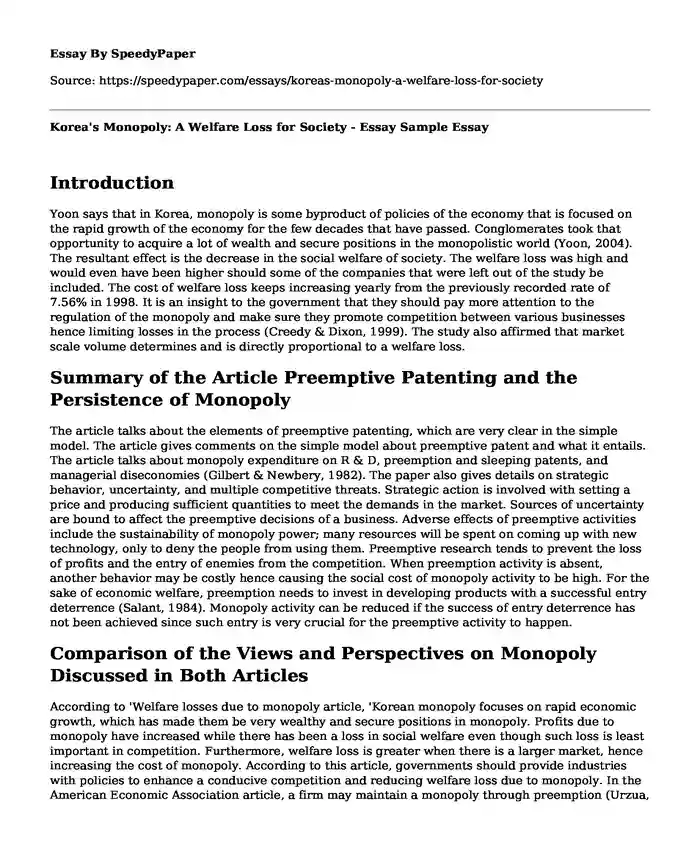Introduction
Yoon says that in Korea, monopoly is some byproduct of policies of the economy that is focused on the rapid growth of the economy for the few decades that have passed. Conglomerates took that opportunity to acquire a lot of wealth and secure positions in the monopolistic world (Yoon, 2004). The resultant effect is the decrease in the social welfare of society. The welfare loss was high and would even have been higher should some of the companies that were left out of the study be included. The cost of welfare loss keeps increasing yearly from the previously recorded rate of 7.56% in 1998. It is an insight to the government that they should pay more attention to the regulation of the monopoly and make sure they promote competition between various businesses hence limiting losses in the process (Creedy & Dixon, 1999). The study also affirmed that market scale volume determines and is directly proportional to a welfare loss.
Summary of the Article Preemptive Patenting and the Persistence of Monopoly
The article talks about the elements of preemptive patenting, which are very clear in the simple model. The article gives comments on the simple model about preemptive patent and what it entails. The article talks about monopoly expenditure on R & D, preemption and sleeping patents, and managerial diseconomies (Gilbert & Newbery, 1982). The paper also gives details on strategic behavior, uncertainty, and multiple competitive threats. Strategic action is involved with setting a price and producing sufficient quantities to meet the demands in the market. Sources of uncertainty are bound to affect the preemptive decisions of a business. Adverse effects of preemptive activities include the sustainability of monopoly power; many resources will be spent on coming up with new technology, only to deny the people from using them. Preemptive research tends to prevent the loss of profits and the entry of enemies from the competition. When preemption activity is absent, another behavior may be costly hence causing the social cost of monopoly activity to be high. For the sake of economic welfare, preemption needs to invest in developing products with a successful entry deterrence (Salant, 1984). Monopoly activity can be reduced if the success of entry deterrence has not been achieved since such entry is very crucial for the preemptive activity to happen.
Comparison of the Views and Perspectives on Monopoly Discussed in Both Articles
According to 'Welfare losses due to monopoly article, 'Korean monopoly focuses on rapid economic growth, which has made them be very wealthy and secure positions in monopoly. Profits due to monopoly have increased while there has been a loss in social welfare even though such loss is least important in competition. Furthermore, welfare loss is greater when there is a larger market, hence increasing the cost of monopoly. According to this article, governments should provide industries with policies to enhance a conducive competition and reducing welfare loss due to monopoly. In the American Economic Association article, a firm may maintain a monopoly through preemption (Urzua, 2013). When preemption is not there, entry-deterring behavior will cause both private and social costs that are higher than the monopoly sustained by preemption.
Yoon finds out that monopoly affects the social welfare of the society as it leads to a drop in it. As many monopolies grow, the lower the social welfare goes. The knowledge from the two articles helps shape the thought process around the gasoline prices. A monopoly, according to Yoon, will lead to a rise in the prices of gasoline, which will lead to the suffering of society. The government should provide industries with avenues to bolster conducive competition hence reducing welfare loss by a monopoly.
References
Creedy, J., & Dixon, R. (1999). The distributional effects of monopoly. Australian Economic Papers, 38(3), 223-237.
Gilbert, R. J., & Newbery, D. M. (1982). Preemptive patenting and the persistence of monopoly. The American Economic Review, 514-526.
Salant, S. W. (1984). Preemptive patenting and the persistence of monopoly: comment. The American Economic Review, 74(1), 247-250.
Urzua, C. M. (2013). Distributive and regional effects of monopoly power. Economia Mexicana. Nueva Epoca, 22(2), 279-295.
Yoon, S. (2004). Welfare losses due to monopoly: Korea's case. Journal of Policy Modeling, 26(8-9), 945-957.
Cite this page
Korea's Monopoly: A Welfare Loss for Society - Essay Sample. (2023, Jul 29). Retrieved from https://speedypaper.com/essays/koreas-monopoly-a-welfare-loss-for-society
Request Removal
If you are the original author of this essay and no longer wish to have it published on the SpeedyPaper website, please click below to request its removal:
- Application Ethics Essay Sample
- Destination-Based Tax, Free Essay on Corporate Taxes
- Essay Example on Causes and Consequences of Rural America
- Aboriginal Culture, Free Essay Sample
- Free Essay Describing the Case of Australia: Mental Health System Change
- Strategic Staffing: Nurturing Growth Through Employee Well-Being - Free Essay Example
- Free Essay on Navigating Workplace Destructive Behaviors: Strategies, Consequences, and Remedies
Popular categories





